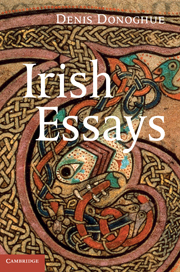10 - Mangan
Published online by Cambridge University Press: 05 June 2012
Summary
On February 15, 1902 James Joyce, aged twenty, read a paper on James Clarence Mangan to the Literary and Historical Society of what is now University College, Dublin. It was a brash performance. Joyce spoke as if he were introducing an unknown poet, and chose to ignore the fact that there were several collections of Mangan's poems at large and that writers as various as John Mitchel, Charles Gavan Duffy, D. J. O'Donoghue, Father Charles Meehan, Louise Imogen Guiney, Lionel Johnson, Francis Thompson, and W. B. Yeats had written of his life and work. “Mangan has been a stranger in his country,” Joyce claimed, “a rare and unsympathetic figure in the streets, where he is seen going forward alone like one who does penance for some ancient sin.” Evidently more interested in Mangan's temperament than in his poems and essays, Joyce spoke of his reserve: “This purely defensive reserve is not without dangers for him, and in the end it is only his excesses that save him from indifference.” Reaching for a comparison, Joyce recalled the passage, already famous, in which Walter Pater completed his “imaginary portrait” of Watteau:
He has been a sick man all his life. He was always a seeker after something in the world that is there in no satisfying measure, or not at all.
- Type
- Chapter
- Information
- Irish Essays , pp. 193 - 200Publisher: Cambridge University PressPrint publication year: 2011
- 1
- Cited by



